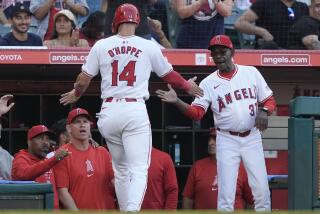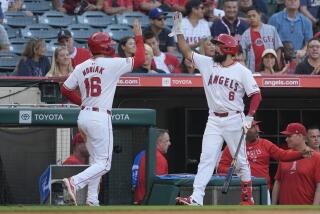Angel Notebook : Davis Doesn’t Mind Being Left Out in Left
- Share via
MESA, Ariz. — Chili Davis doesn’t get defensive when asked about his new residence in left field. Some might say he wasn’t too defensive in right field, either, but that’s too easy a line; this is a new year, and those 19 outfield errors in 1988 were really no laughing matter.
“Left field?” Davis said. “I don’t mind. Whatever helps us win. Actually, I thought they’d put me at first base--just in case Wally didn’t sign.”
Such a precaution won’t be necessary. First baseman Wally Joyner signed his 1989 contract with the Angels earlier this month, two days after Davis had signed a three-year deal worth more than $4 million. And that was a month after the Angels had signed Claudell Washington to a three-year contract, the move that set Davis’ shift to left in motion.
Washington, a good defensive player, will replace Davis in right field, where a club-record 19 errors went skipping off and around Davis’ glove last season. Davis is to be stationed in left, where Manager Doug Rader hopes the change in scenery will do him good.
“Chili had some defensive shortcomings in right, especially early last year,” Rader said. “It might be to his benefit to put him in (left field) and not bring back any old memories.”
Davis didn’t play much left field during his six seasons with the San Francisco Giants.
“Just in spurts,” he said. “Usually when Roger (Craig, Giant manager) came up with one of his ingenious ideas. He’d want to keep a pitcher in a game (after making a pitching change), so he’d move the pitcher to right field and me to left.”
There’s more permanence surrounding this move. Barring an injury to Washington or center fielder Devon White--or designated hitter Brian Downing--Davis figures to be left in left.
He promises no Gold Glove, but expects to hold on to more baseballs in 1989.
“Last year, I was a little tentative,” he said. “I had surgery the year before and they put a pin in my shoulder. When I first signed here, there were some questions about my shoulder. It was recommended to me that I stay away from diving at balls for a year.
“I did dive a few times and nothing happened. I didn’t get hurt, so I think I can be more aggressive and go back to taking chances in the outfield.”
Davis also discussed his biggest catch as an Angel--the lucrative three-year contract he wangled out of the supposedly tight-fisted Mike Port.
“My negotiations were real pleasant,” Davis said. “I have to give my agent (Tom Reich) a lot of credit. He has a good rapport with a lot of teams, and with Mike.
“If you go in and try to play hardball with (Port), he’ll play hardball back with you. He’s got to feel comfortable with you. He’s not as tough a cookie as I had read, if you go in and establish credibility with him.”
In 1988, Davis established some credibility with the bat, hitting 21 home runs and driving in a career-high 93 runs.
In 1989, the task at hand is getting it right with the glove.
Second baseman Mark McLemore requested and received permission to leave camp Friday and returned home to Diamond Bar “for personal reasons,” the club announced.
According to Rader, McLemore called him Thursday night and asked for a short leave. The Angels say McLemore is expected back in Mesa by the end of the weekend.
Angel Notes
The Angels signed pitcher Terry Clark to a one-year contract worth $85,500 Friday afternoon. Clark, 6-6 with a 5.07 earned-run average with the Angels in 1988, tied Bo Belinsky’s club rookie record by winning his first five decisions before hurting his shoulder and slumping to 1-6 the rest of the way. During the winter, Clark’s injury was diagnosed as a partial tear of the right rotator cuff, but Clark decided to forgo surgery.
“I’m trying to build it up with weights,” Clark said. “With some guys who’ve had the same thing, they’ve healed in a couple of weeks or a couple of months. If it’s still bothering me by opening day, we can ‘scope it (have arthroscopic surgery) and try to fix it then.”
The Angels will play their annual charity game for Desert Samaritan Hospital Sunday afternoon. The opposition will be provided by a group of local businessmen, who pay for the privilege of playing an inning or two against major leaguers.
More to Read
Go beyond the scoreboard
Get the latest on L.A.'s teams in the daily Sports Report newsletter.
You may occasionally receive promotional content from the Los Angeles Times.






